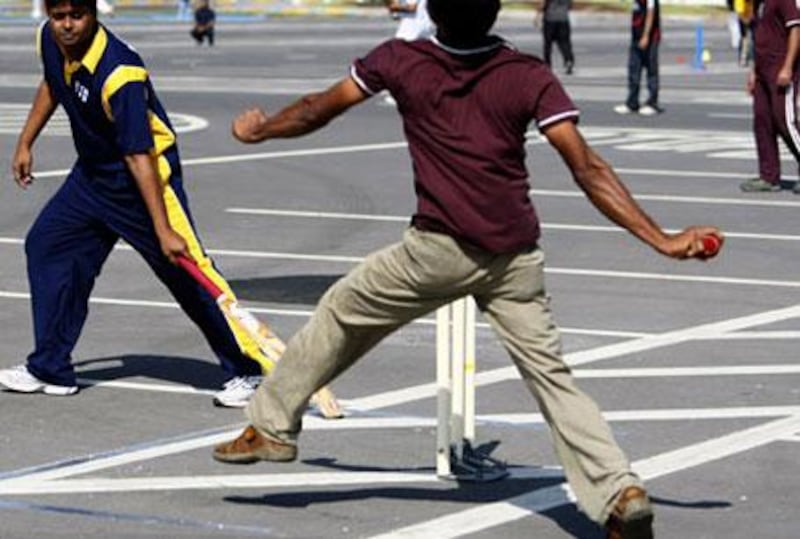Last Friday, after Juma prayers, with the sun at its apex, two white vans pulled into a corner of a huge, empty car park off Abu Dhabi's Corniche Road. Eleven men wearing salwar kameez and baseball caps got out, each greeting the rest with handshakes and hugs, gathering in the vehicles' shadow. A pair measured out the 22 paces of a cricket pitch, placing a wooden wicket at each end - soon a match was under way. Over the next 30 minutes, more teams arrived and the one match became three, three quickly grew to eight. Each group spoke their own language - Pashto, Tamil, Bengali and Urdu were all heard - but rising from every direction were the unmistakable universals of the cricket lexicon: "Bowling! BOWLING!"; "Shot!"; "Howzat!"
While it may seem that street cricket is played in all of Abu Dhabi's empty lots, grass patches and side lanes, every weekend in the early mornings and late afternoons, this car park becomes the sport's unofficial epicentre in the city. Teams of friends, usually of the same nationality, gather every Friday and Saturday to play each other, while official company teams compete in more organised tournaments that can last for five or six consecutive weekends.
Wearing shorts, gold chain and a Sri Lankan cricket shirt, Muhammad Hafeel, the captain of a team who sometimes organises tournaments, stood by as his friends unloaded gear from their 4x4. He explained that he usually gets eight or 10 teams together and that all the players contribute money toward a trophy and a prize - which has included a plane ticket home for the winning team's captain. "The Sri Lankans play against each other and against the Pakistani teams, but the Indians only play against the Indians," he said, pointing at two teams in official-looking kits who were warming up.
But he may have misread the Indians' insularity. Wearing one of the "Indian" side's maroon strips, Rashad Hussein, a muscular 25-year-old car-rental salesman from Parichinar in Pakistan's tribal areas, warmed up his bowling arm. When asked about any ethno-nationalist tensions on the pitches, Hussein smiled and joked, "No, because the Indians are much better." The two teams were taking part in the last stages of a five-week-long tournament contested by seven ETA teams, a local company with a number of subsidiary businesses.
Each of the teams represented one of the company's businesses; by last Friday only four remained, and were playing in the weekend's semi-finals. The final is to be played today and next week, on March 27th, all the teams will reunite for an awards ceremony and family lunch at the Indian Social Centre in Mina. Karuna Karan, the ETA tournament's coordinator, said that this year, for the first time, the company's welfare department organised the event after requests by employees.
Rafik Muhammad the 23-year-old star fast bowler of the opposing team, and a native of Tamil Naidu, explained the rules of this version of street cricket. "There are five bowlers and each bowler gets three overs- the highest total ever on this ground was 146." Muhammad's teammates crowded around, all wearing their yellow kits with red numbers on the back and the Indian and Emirati flags on the front.
From a distance it is nearly impossible to determine where one match begins and where it ends. What seem to be umpires for one match, standing in front of a bowler as he runs toward the pitch, turn out to be fielders from an entirely different team, standing in what for them is the boundary's edge. As the ETA match progressed and the players grew more tense - with the steady rhythm of construction from a group of towers nearby serving as stadium noise - a group of Pakistani cricketers, one barefoot, another in football boots, walked directly across the pitch, forcing the bowler to abort his run-up. They carried what were to become their wickets - chunks of concrete and what looked to be two small slaps of plasterboard.
While no one seemed to know who organised the first matches on the car park, it is but the latest home for the nomadic adherents of what might be thought of as a particularly of-the-Emirates sport. "We've been playing here for the past year," said Hafeel. "Before that in Musaffah and also in Mina," wherever the teams could find an empty space big enough for multiple matches. Before long, all the sites were built upon. Hafeel fears that soon the Corniche cricketers will be looking for a new home. "Once these buildings finish," he said, pointing at the construction site next to the car park, "this will all be finished. Already there are too many cars here. But we have already found another place that will be good."
* Taimur Khan






